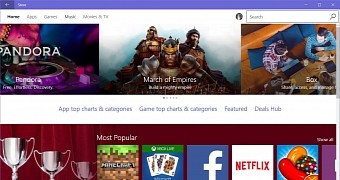Windows 10 Mobile is almost here for Windows Phone device owners, but the majority of them are already running the OS as part of the insider program, so they know what to expect from Microsoft's new smartphone operating system.
Certainly, Windows 10 Mobile comes with a long list of improvements and is living proof that Microsoft might be going in the right direction in the smartphone business, but Windows Phone's biggest problem still exists in this new platform. The lack of apps is still impacting adoption of Windows 10 Mobile, and more users look at Android and iOS these days, as they lose hope that Microsoft can do anything about it.
But the Redmond-based tech giant is playing a different card these days and it bets big on universal apps, which are designed to work on both PCs and smartphones with the same UI and feature lineup.
And in the last few months, several key executives have one by one promised to improve Windows 10 Mobile and fix the lack of apps as soon as possible. Including the company's CEO Satya Nadella, that is.
Developers, developers, developers
Steve Ballmer's famous “developers, developers, developers” dance certainly seems less awkward these days when it's pretty clear that this is what Windows 10 needs. Developers are the key to Microsoft's success in mobile and that's exactly what the company's executives have said with so many occasions.
Nadella was the first to promise a bright future for Windows Phone after his predecessor himself questioned the company's strategy of not bringing Android apps on its platform. Nadella explained that it's more important to focus on universal apps, and asked for more time because this can't change overnight.
“This is new. We’ve had different efforts in the past but we now have one store and one app platform. Give us time to keep focused on it,” he said in a meeting with shareholders.
“We are seeing, for example, for the first time on the core of Windows desktop, with 100-plus million users, active engagement, the fact that they can find these Windows applications in the store, some of the developers like Netflix are seeing more engagement for the Netflix app vs. the web. So that’s an early indicator of data that I think will entice more of these developers to build more of these applications.”
“If you build for Windows 10, you build for everyone”
Then, it was Microsoft Developer Evangelism Chief Steve Guggenheimer's turn to emphasize the advantages of universal apps. He explained in an interview that building apps for Windows 10 creates many more opportunities for developers because this way they can target buyers of different devices with the same app.
"It doesn't matter where they (developers) start. The core work is done for all the (Windows 10) platforms. If you're building for 10, it's already done for phone/ A true Windows 10 (UWP) app is a phone app. It's up to us (Microsoft) to get devices in market that are unique and differentiated for the phone,” he said.
“As (Windows 10) usage goes up, it will be a self-fulfilling place. Our (developer) conversations right now are proactive. But going forward, there will be more traction.”
“We'll do better”
Chris Capossela, Microsoft's chief marketing officer, said in a recent podcast that the Redmond-based tech giant plans changes to the mobile platform that would address the lack of apps and convince disappointed users to stick with their devices.
He admitted that Microsoft is not doing very well in mobile, but promised to do better in the future.
“We’re clearly very cognizant of our position in the phone world, and frankly we’ve done the hard yards to retrench and have an approach that, in this coming year, is very much about trying to satisfy our fans, and trying to have a great success in the business world, for businesses who want to buy phones for their employees,” he said.
It's all about Windows 10
More recently, Microsoft's CEO Satya Nadella again pointed to universal apps as the one way to improve the platform and address the lack of apps that makes so many people jump ship.
Looking at Windows Phone's market share as a stand-alone platform is not relevant, he said, mostly because Windows 10 is now an operating system available on all devices, so building one app can tackle both PC and mobile users at the same time. So when speaking about Windows 10 Mobile's performance we should actually look at Windows 10 as a whole, he said.
“I think we do ourselves a disservice if we measure our success by just looking at: What’s the market share of HoloLens? What’s the market share of Xbox? What’s the market share of PCs? What’s the market share of our phones?” Nadella pointed out.
“Go back to what I said about the mobility of experience. If you think of this more like a graph, these [devices] are all nodes. Sometimes the user will use all of these devices … sometimes they’ll use only one or two of our devices and some other platforms — so be it. But we want to make sure that we are completing the experience across all of these devices.”
Certainly, universal apps can indeed help the platform improve, but it's hard to believe they can make a difference until major developers join the Windows 10 bandwagon. And for the moment, some don't seem to be interested in doing this at all.

 14 DAY TRIAL //
14 DAY TRIAL // 